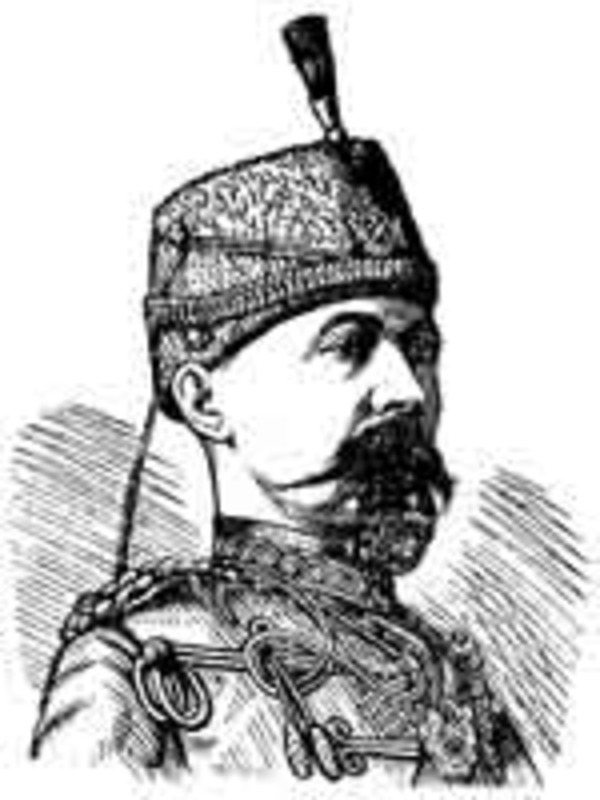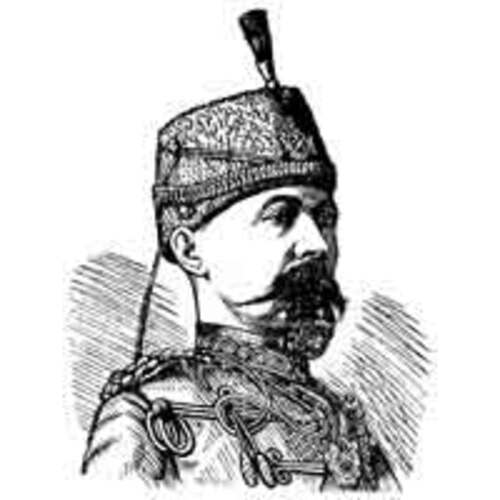
Source: Link
McKEAND (Mackeand), ALFRED, soldier and businessman; b. 28 Sept. 1849 in the parish of Gorbals (now part of Glasgow), Scotland, son of James McKeand and Emma Kilnar; m. in 1879 a Miss Cochrane, and they had four children; d. 13 Feb. 1887 in Winnipeg, Man.
James McKeand was a partner in a wholesale dry goods firm in Glasgow which had a branch in Hamilton, Canada West. In 1854 he and his family settled in Hamilton, where he personally managed this branch. Alfred McKeand attended local schools until his early teens when he entered the employment of James and John Turner, wholesale grocers, as an office boy. He gradually worked his way up to bookkeeper and then confidential clerk of the establishment. In 1879 McKeand was accepted as a full partner, and with James Turner Jr, son of one of the owners, proceeded to Winnipeg to establish a western branch of Turner, McKeand and Company.
In Alfred’s generation the McKeands became a decidedly military family. He had enlisted as a private in the 13th (Hamilton) Battalion of Infantry in 1869, joining three brothers. He progressed through several non-commissioned ranks before being promoted ensign on 28 May 1875 and lieutenant on 14 Jan. 1877. Once he was in Winnipeg, Lieutenant McKeand formally took leave of the 13th Battalion on 28 Jan. 1881, and on 13 May joined the Winnipeg Infantry Company. Two months later McKeand was promoted to captain and given the command of the company. He was instrumental in bringing the unit into the 90th Winnipeg Rifles upon the latter’s formation in November 1883. As commanding officer of one of the battalion’s founding units, Captain McKeand was appointed junior major on 26 March 1883.
When the North-West rebellion broke out in 1885 [see Louis Riel], McKeand, then senior major, mobilized and led the 90th Battalion as its temporary commander in the absence of Lieutenant-Colonel William Nassau Kennedy, who was in the Sudan with the Canadian voyageurs accompanying the Gordon relief expedition. The behaviour of some riflemen at Fish Creek (Sask.) in April betrayed the inexperience of the battalion which, however, went on to acquit itself fairly well in May in its support role at Batoche. He proved a competent and steadfast commander under fire; he received mention in the dispatches of Major-General Frederick Dobson Middleton*, who also recommended his promotion to brevet lieutenant-colonel. While the battalion was at Fish Creek, news had arrived of the death of Lieutenant-Colonel Kennedy in London, England, and Major McKeand had succeeded to the command of the 90th Winnipeg Rifles on 29 May 1885, a position he retained until his own death less than two years later.
McKeand was typical of the late-19th-century Ontario businessmen who recognized the economic link between the opening of the Canadian west and the expansion of the industrializing east. By extending his firm into the prairies he developed a personal stake in western Canada, and was also instrumental in maintaining those military corps considered necessary for the political security of the west; he did not hesitate to mobilize his battalion against an armed revolt which he believed threatened the future of the west in confederation.
Canada, Dept. of Militia and Defence, Report upon the suppression of the rebellion in the North-West Territories, and matters in connection therewith, in 1885 (Ottawa, 1886). Daily Manitoban (Winnipeg), 14 Feb. 1887. Hamilton Spectator, 6 Jan. 1894, 11 Oct. 1924, 26 June 1925. Times (Hamilton, Ont.), February 1887. E. J. Chambers, The 90th Regiment: a regimental history of the 90th Regiment, Winnipeg Rifles ([Winnipeg], 1906).
Cite This Article
J. A. Rodger Letourneau, “McKEAND (Mackeand), ALFRED,” in Dictionary of Canadian Biography, vol. 11, University of Toronto/Université Laval, 2003–, accessed December 31, 2025, https://www.biographi.ca/en/bio/mckeand_alfred_11E.html.
The citation above shows the format for footnotes and endnotes according to the Chicago manual of style (16th edition). Information to be used in other citation formats:
| Permalink: | https://www.biographi.ca/en/bio/mckeand_alfred_11E.html |
| Author of Article: | J. A. Rodger Letourneau |
| Title of Article: | McKEAND (Mackeand), ALFRED |
| Publication Name: | Dictionary of Canadian Biography, vol. 11 |
| Publisher: | University of Toronto/Université Laval |
| Year of publication: | 1982 |
| Year of revision: | 1982 |
| Access Date: | December 31, 2025 |



